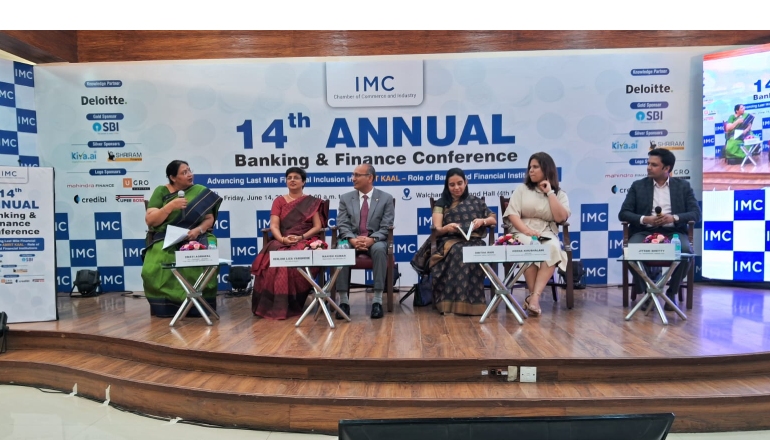The UN’s 17 SDGs address critical issues like access to clean water and sanitation, sustainable energy, and building sustainable cities. Importantly, the SDGs are interconnected. Progress on one goal can support the progress of the other. For example, ensuring access to clean energy (SDG 7) can contribute to reducing poverty (SDG 1) and improving health outcomes (SDG 3). This interconnectedness highlights the need for a balanced approach to social, economic, and environmental sustainability. This was the crux of IMC’s 14th Annual Banking & Finance Conference.
Experts discussed the pivotal role that the banking, non-banking, and financial industries is playing in the government of India’s ambitious financial inclusion drive during a day-long event.
Inaugurating the conference, Himanish Chaudhuri, Partner and Financial Services Industry Leader, Deloitte India, said that India is the poster child of financial inclusion. “We have conquered the complexities of the problem by using technology. We are data-rich. We want to go from being information-rich to being data-rich to reach the insight-rich stage. This will help us to drive last-mile financial inclusion.”
One such panel discussion was on: How Financial Institutions can play a Pivotal Role in Achievement of Sustainable Development Goal
The panel included Manish Kumar, Head of ESG & CSR, ICICI Bank Ltd, Renjini Liza Varghese, CEO, WriteCanvas, Smitha Hari. President (India), auctus ESG, Heena Khushalani, Partner, Climate Change and Sustainability Services, EY India, Jitesh Shetty, Co-Founder/CEO, Credible ESG. The panel was moderated by Swati Agrawal, CEO & President – Advisory, CARE Analytics and Advisory Pvt. Ltd.
Some edited excerpts:
Manish Kumar
All conventional sources that specify and use green are termed green bonds. Some new instruments, like securitization, have been introduced in the market. In this case, a pool of receivables with sustainability or green as an end-use can be securitized as a source for raising liabilities.
Heena Khushalani
We have witnessed tremendous momentum being created at the awareness level of green lending among banks during the past year. Has it progressed? Not really. They’re trying to figure out how to do it while maintaining the economics, which is why it’s not progressing because of everyone’s current predicament or dilemma.
Smitha Hari
Projects related to the Sustainable Development Goals are seen as having a high risk and low return when looking at the capital stack. For these, the grants or philanthropies come with the lowest rate, followed by government subsidies, equity, and debt. Dfis and MDB Capital can influence the market with diverse instruments in the form of credit enhancements. Instead of directly lending, if they come in with a credit enhancement, that can multiply the market
Renjini Liza Varghese
The absence of a clear narrative, inconsistent delivery, and missing data points present the three main obstacles to effectively communicating with the stakeholders. Filling in the blanks with data is crucial to constructing a consistent story.
Jitesh Shetty
Customers want data to flow in a seamless automated way. But the challenge is from within the bank or the enterprise. They don’t have the right owners of the data. The data not in the right place. But that is changing now with BRSR.
Other panels also touched upon ESG and rising climate risk :
Dr. Srikanta K. Panigrahi, Director General and Distinguished Research Fellow, Indian Institute of Sustainable Development (IISD), New Delhi
These days, risk finance is becoming increasingly popular. Thanks to the RBI’s climate-related financial risk disclosure on the public platform, leading banks like the State Bank of India have developed risk assessment procedures and are hiring climate risk officers in prime branches. The banking sector is empowering the green offshoot.
Rajiv Anand, Deputy Managing Director, Axis Bank Limited
Axis Bank has a board-level ESG committee, with its chair also serving on the credit committee. When it comes to green financing, we view the world through two lenses: our credit lens, which acts as a ban, and our ESG lens.

